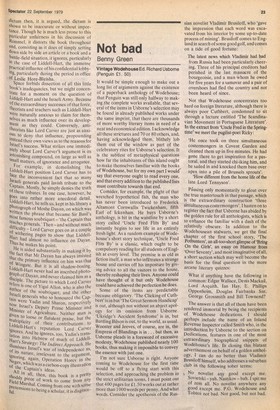Carve-up
Patrick Cosgrave
Apostles of Mobility Lord Carver (Weidenfeld £6) The essential purpose of Field Marshal Carver's Lees-Knowles lectures (delivered at Cambridge earlier this year, and printed in this slim volume) is to cut down to size the reputations as military theorists of Major General J.F.C. Fuller and Captain Sir Basil Liddell-Hart, both of whom are thought by their admirers to be the foremost military theoreticians of the age and, in particular, the prime exponents of tank warfare, the Blitzkrieg and the art of mobility on the battlefield. The last sentence of the book accurately conveys the flavour of his approach. 'The writings of Fuller and Liddell-Hart', he believes,'. , . are likely to be sought by the curious and most of them are kept in some of the libraries.'
It was a task that needed to be undertaken, if not, perhaps, with quite the relish and superficiality with which Lord Carver approaches it. Thus, for example, the book restores to a just place in the history of tank warfare the pioneers Swinton, Stern and Martel. Again, there is a very capable description of Rommel's North African campaigns which effectively emphasises the way in which an exceptionally intuitive soldier reacted to circumstances without being burdened by too much book learning. Finally, Lord Carver does an effective hatchet job on a late article of Liddell Hart's in which he claimed that the Israeli victory in the 1967 war was, althost totally, a result of the application of his two favourite principles—that of the indirect approach and that of the expanding torrent. However, one would have a great deal more confidence in Lord Carver's criticisms if one felt he had gone to any trouble to ascertain the facts, or if one was convinced he understood truly the relationship between a general's training and his battle-field performance. He repeats ad nauseam the obvious point that every, battle is unique, and that a really good general adapts to fighting at speed. The trouble, is that he elevates this general truism into a particular criticism of particular writings of his two betes noires. Thus, if ageneral can be shown to have varied from a Fuller or Liddell-Hart dictum then, it is argued, the dictum is Shown to be inaccurate or without impor tance. Though he is much less prone to this Particular unfairness in his discussion of Rommel, it distorts the book throughout and, consisting as it does of simply setting down side by side an article or a book and a battle-field situation, it ignores, particularly in the case of Liddell-Hart, the immense Practical influence of his confidential lobbying, particularly during the period in office of Leslie Hore-Bleisha.
Space forbids dissection of all this little book's inadequacies, but we might concentrate for a moment on the question of Liddell-Hart and the Israeli Army. Because of the extraordinary successes of that force, theorists and teachers such as Liddell-Hart were naturally anxious to claim for themselves as much influence over its development as they could. Conversely, antitheorists like Lord Carver are just as anxious to deny that influence, propounding instead their own views as to the reasons for Israel's success. What strikes one immediately about Lord Carver's argument is its astonishing compound, on large as well as small matters, of ignorance and arrogance. For example, in demolishing the Liddell-Hart position Lord Carver has to face the inconvenient fact that so many Israeli generals paid lavish tribute to the Captain. Mostly, he simply denies the truth Of these tributes. In one case, however, he goes into rather more anecdotal detail. Liddell-Hart, he tells us, kept in his library a Photograph of Moshe Dayan, on which was Written the phrase that became Sir Basil's thost famous soubriquet — 'the Captain that teaches generals.' Then —and without much difficulty — Lord Carver goes on in a couple of withering pages to show that LiddellHart had almost no influence on Dayan. Thus he makes his point. He is aided substantially in making it by the fact that Mr Dayan has always insisted that the primary influence on him was that of Wingate. But it is all shadow-boxing. Liddell-Hart never had an inscribed photograph of Dayan, and never claimed him as a disciple. The picture to which Lord Carver refers is one of Yigal Allon, who is also the author of the soubriquet; and the other Israeli generals who so honoured the Captain were Yadin and Sharon, respectively now Israel's Deputy Prime Minister and Minister of Agriculture. Neither man is given to loose or flatulent praise, but the multiplicity of their contributions to Liddell-Hares reputation Lord Carver tgnores. And he ignores, too, Yadin's translation into Hebrew of much of LiddellHart's Strategy: The Indirect Approach. He dismisses Israel's war of independence as, Of its nature, irrelevant to the argument, ignoring, again, Operation Horev in the Negev, which was a carbon-copy illustration Of the Captain's ideas. _ All in all, then, this book is a pretty shoddy piece of work to come from any Field Marshal. Coming from one with some pr etensions to being a scholar, it is disgraceful.



































 Previous page
Previous page